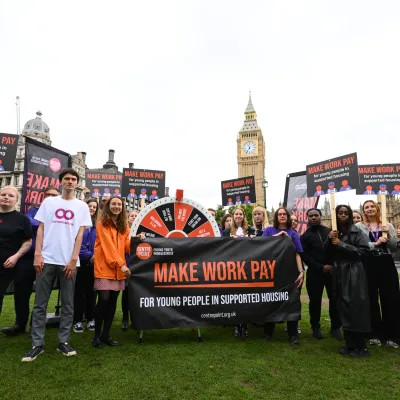As we battled through the worst of the Coronavirus and the economy ground to a startling halt, the government put protective measures in place which included a ban on home evictions across England and Wales.
The ban temporarily protected renters from eviction and court removals. This was to help those who really felt the effects of the pandemic, giving breathing space to renters who had struggled with payments after losing jobs or loved ones. Essentially, it aimed to protect those who could potentially be penalised for something that was completely out of their control. It also stopped those who were on the precipice of the eviction process pre-pandemic from becoming homeless amid the chaos.
But as of Sunday 20 September, landlords will once again be able to evict tenants in England and Wales. This is no doubt a scary time for many – the effects of Covid-19 are far from over, even if many aspects of life seem to be returning to normal. If you find yourself with an eviction notice, we want to assure you there are measures you can take that could help with your situation.
One important thing to remember is as that the courts begin eviction cases again, they will be prioritised, with cases involving domestic abuse or anti-social behaviour being reviewed first. This means a slower approach will be taken, rather than a rush to go through cases quickly, so proceedings may still take some time to process.
So, how does it work?
- A landlord has to give the tenant three months’ notice to vacate the property (six months in Wales), and then apply to the courts. This applies to both Section 8 and Section 21 notices. The courts and bailiffs have a backlog of cases and will write to tenants about their case. You may be able to ask the court to stop the eviction, especially if you rent from the council or housing association.
- The court, however, aren’t usually able to stop an eviction if you rent privately and your landlord is following the correct legal process – but they can stop an eviction if your landlord gives you an invalid notice. There are a number of things that can make a notice invalid – you can take a look at them here.
- Landlords will need to fill in a form that states whether their tenant has been affected by Covid-19. If you have been affected by Covid-19, unfortunately the facts will have little bearing on the outcome of the hearing. But if the landlord doesn’t provide the information, the case can be adjourned.
What are your rights?
If you think you may be evicted, have been handed notice to leave or are being harassed to leave by your landlord, know your rights. These are as follows:
- It is illegal for your landlord to lock you out of your home, harass you into leaving, or force you to leave without a court order or without giving notice. You should stay in your home, regardless of whether or not you have somewhere else to stay.
- You are entitled to a three-month notice period. If you’re a council or housing association tenant, or a private renter who gets a section 21 or section 8 notice, this is the minimum notice you would require. You don’t have to leave once your notice ends, and the landlord will need to apply to court if they still want you to leave.
We are here to help
We understand that this is a really scary time for people who might be facing eviction. We want to help as much as possible, so please, if you’re worried, call the Centrepoint Helpline on 0808 800 0661 and a member of our team will be able to advise you as best as possible on your situation. But the key points to remember are these:
- There is likely to be a lot of time between receiving a notice and the court proceedings.
- You don't have to leave when the notice period ends. Your tenancy continues if you stay in your home.
- If a landlord is undertaking an illegal eviction, you can get legal advice to apply for an injunction, or speak to the local authority who might have an enforcement team who can help.
We try to help those who call our Helpline as much as possible, but we strongly advise seeking professional legal advice for eviction cases, and there are a number of places you can contact. Try Civil Legal Advice, the Citizen’s Advice Bureau, or Shelter. You might also be able to apply for legal aid. Remember, you don’t have to go through this alone.






